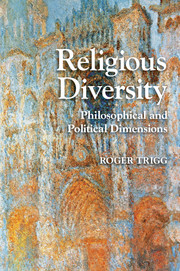Book contents
- Frontmatter
- Dedication
- Contents
- Introduction
- 1 The Challenge of Religious Diversity
- 2 Do Religions Claim Truth?
- 3 Religious Pluralism
- 4 The Roots of Religious Belief
- 5 Does Disagreement Undermine Theism?
- 6 Education and Religious Diversity
- 7 Truth and Coercion
- 8 Religious Diversity and Identity
- 9 Religion as Personal Preference
- 10 Freedom and Religion
- Bibliography
- Index
Introduction
Published online by Cambridge University Press: 05 June 2014
- Frontmatter
- Dedication
- Contents
- Introduction
- 1 The Challenge of Religious Diversity
- 2 Do Religions Claim Truth?
- 3 Religious Pluralism
- 4 The Roots of Religious Belief
- 5 Does Disagreement Undermine Theism?
- 6 Education and Religious Diversity
- 7 Truth and Coercion
- 8 Religious Diversity and Identity
- 9 Religion as Personal Preference
- 10 Freedom and Religion
- Bibliography
- Index
Summary
As a result of what sociologists call “globalization,” with modern travel and communications, growing economic links, and mass movements of populations from one continent to another, peoples of many different cultures and religions find themselves in daily contact with each other. There have always been many religions, but people have not always been constantly challenged by alternatives. They were able to live in their own small sphere and not have to face real differences from day to day. Settled communities could become very complacent and inward-looking. That has not always been so. The ancient Roman Empire was, for example, awash with different cultures and religions rubbing up against each other. Differing religions have always had to take account of religious diversity, and to be aware of competition.
Even so, in the modern world, no one can escape the fact of diversity in religion and elsewhere, and it is bound to provoke problems in a more pressing way than in previous generations. Two aspects of this are particularly important. Many, both believers and non-believers, can see such diversity and wonder whether the plethora of religions may not cancel the significance of any. They are so different that it appears impossible for them all to be true. The rational conclusion might be that none of them are. Another reaction could be that it is not the function of religion to proclaim “truth.” Either way, the self-understanding of different religions is challenged. Major questions in the philosophy of religion have to be confronted. Some, indeed, put the fact of religious diversity in the same category as the vexed problem of evil, seeing it as a rational challenge to religious faith. It may seem difficult to explain why God allows suffering and evil, but to many it may seem just as difficult to understand what any God, who wishes a worshipful response from humans, should make it so difficult to believe by providing so many competing faiths.
- Type
- Chapter
- Information
- Religious DiversityPhilosophical and Political Dimensions, pp. 1 - 3Publisher: Cambridge University PressPrint publication year: 2014



